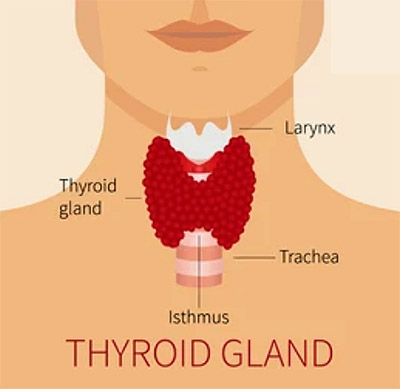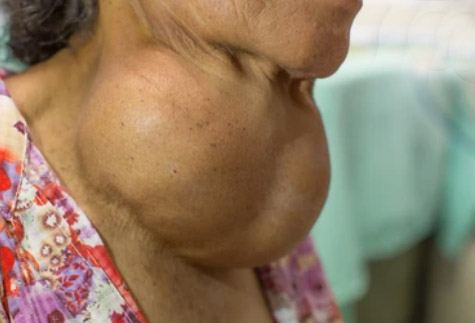Thyroid Disease


The thyroid gland is one of the most important glands in the endocrine system, and it produces a number of hormones that affect everything from heart health to metabolism. One of those hormones is thyroxine, also known as T4. Thyroxine is a crucial hormone as it controls and protects your overall health, determining how well each cell and organ in the body functions
What does Thyroxine do?

Thyroxine is a hormone the thyroid gland produces and then secretes into the bloodstream. Once in the bloodstream, thyroxine travels to the organs, like the liver, heart, brain and kidneys, where it is converted to its active form of triiodothyronine. Thyroxine plays a crucial role in heart and digestive function, metabolism, brain development, bone health, and muscle control. It affects almost all of the body’s systems. From birth to death proper thyroxine levels are vital for health.
What Can Go Wrong with Thyroxine?
Having too little thyroxine or too much thyroxine can cause health problems. If the body releases too much thyroxine, you will suffer a condition called thyrotoxicosis. This can cause a goiter, which is a swelling of the neck because of an enlarged thyroid gland. Thyrotoxicosis can also cause menstrual irregularities, an increase in bowel movements, weight loss, heat intolerance, fatigue, and irritability. Thyrotoxicosis is commonly caused by hyperthyroidism, tumors in the thyroid gland, or thyroid inflammation.
The body can also produce too little thyroxine, a condition known as hypothyroidism. Low thyroxine levels cause problems with development if it occurs when an individual is young. In adults, thyroxine deficiency will lower the metabolic rate, causing weight gain, memory problems, infertility, fatigue, and muscle stiffness.
Thyroiditis is also a common problem in women and it causes the thyroid to enlarge and develop nodules. This occurs due to autoimmunity- antibodies being produced against the thyroid gland.
The following thyroid diseases may be encountered:
Thyroxine plays a crucial role in heart and digestive function, metabolism, brain development, bone health, and muscle control. It affects almost all of the body’s systems. From birth to death proper thyroxine levels are vital for health says Dr Noel Somasundaram, Consultant Endocrinologist
Hypothyroidism
Hypothyroidism is when your thyroid does not make enough thyroid hormones. It is also called underactive thyroid. This slows down many of your body’s functions, mainly your metabolism.
The most common cause of hypothyroidism is Hashimoto’s thyroiditis. The immune system mistakenly attacks the thyroid-resulting in damage of the thyroid so that it does not make enough hormones.
Symptoms of hypothyroidism develop slowly, often over several years. At first, you may feel tired and sluggish. Later, you may develop other signs and symptoms of a slowed-down metabolism, including:
- Feeling cold when other people do not
- Constipation
- Muscle weakness
- Weight gain, even though you are not eating more food
- Joint or muscle pain
- Feeling sad or depressed
- Feeling very tired
- Pale, dry skin
- Dry, thinning hair
- Slow heart rate
- Less sweating than usual
- A puffy face
- A hoarse voice
- More than usual menstrual bleeding
The treatment involves using replacement doses of thyroxine and correction of underlying factors.
Hypothyroidism and Pregnancy
Pregnancy causes major changes in the levels of Thyroxine hormones made by the thyroid gland. Thyroid problems sometimes may begin or get worse during pregnancy or after childbirth.
Hypothyroidism during pregnancy is relatively common. However, the symptoms can be overlooked because some mimic the hormonal changes of a normal pregnancy, such as tiredness and weight gain.
If not untreated, maternal hypothyroidism may pose a risk for both mother and baby. A pregnant woman’s thyroid hormones are vital not only for her but also for the development of her baby. Pregnant women with uncontrolled hypothyroidism can get high blood pressure, anemia , and muscle pain and weakness. There is also an increased risk of miscarriage, premature birth or even stillbirth.
A common cause of underactive thyroid in pregnant women is thyroiditis- an autoimmune disease when your immune system forms antibodies that attack the thyroid. As a result, the thyroid gland fails to produce adequate thyroid hormone.
What is the treatment for hypothyroidism in pregnancy ?
The treatment for hypothyroidism is thyroid hormone called T4 (levothyroxine). This drug is exactly the same as the T4 your body makes and is safe for pregnant women and the baby.
Before pregnancy. It is important that thyroid hormone levels are normal both before and during pregnancy. If you are already receiving levothyroxine to treat hypothyroidism, you should have your thyroid hormone levels checked before you try to conceive. If your TSH levels are too high, you will need an increase in your dose of levothyroxine. You should delay pregnancy until your disease is well controlled. At DHC we specialise in counselling women who are planning to conceive on adjusting their doses to get the best results. Most women also find it difficult to conceive because of the poor control of thyroid hormone levels and once the TSH and T4 levels are adjusted to the correct levels they are able to conceive. In subfertile women who seek counselling for fertility we also check their antibody levels as they may impair ability to conceive- let our team at DHC led by Dr Noel Somasundaram talk to you if you have these issues.
During pregnancy. Once a hypothyroid woman becomes pregnant, the levothyroxine dose often must increase. Possibly the dose must go up by as much as 30% or more in the first 4 to 6 weeks of pregnancy. Contact our team at DHC soon after you know you are pregnant, so you can get a thyroid function blood test and discuss your treatment plan with our experts.
If you receive a new diagnosis of hypothyroidism during pregnancy, you will need your T4 levels brought to normal as quickly as possible. Our team led by Dr Noel Somasundaram may give you increasing doses of levothyroxine until your T4 levels become normal. About 30 to 40 days after you start treatment, you should have your thyroid function retested.
Also, your thyroid testing should be done often during pregnancy, usually every 4 to 6 weeks until delivery.
After pregnancy. After delivery, we work with your obstetric team to decrease the levothyroxine dose to what is appropriate based on your weight.
What can you do to help have a healthy baby?
You can help ensure your baby’s health and your own health. Work with your Obstetrician and endocrine team led by Dr Noel Somasundaram to plan your pregnancy and receive proper medical care before, during, and after pregnancy. Take your medications as prescribed, do not stop them during pregnancy as thyroxine is safe and essential for the baby.
Do not take thyroxine at the same time vitamins or supplements containing calcium and iron. These can interfere with the absorption of thyroid hormone. Take these vitamins at least 2 or 3 hours after taking your levothyroxine.
If you are already receiving levothyroxine to treat hypothyroidism, you should have your thyroid hormone levels checked before you try to conceive Dr Noel Somasundaram, Consultant Endocrinologist
Hyperthyroidism

- Hyperthyroidism, or overactive thyroid; it causes thyroid to make too much thyroid hormone. This speeds up many of your body’s functions, like your metabolism and heart rate.
- The most common cause of hyperthyroidism is Graves’ disease. Graves’ disease is an auto-immune system disorder where antibodies stimulate the thyroid gland.
- At first, you might not notice the signs or symptoms of hyperthyroidism. Symptoms usually begin slowly. But, over time, a faster metabolism can cause symptoms such as:
- Weight loss, even if you eat the same or more food (most people lose weight)
- Eating more than usual
- Rapid or irregular heartbeat or pounding of your heart
- Feeling nervous or anxious
- Feeling irritable
- Trouble sleeping
- Trembling in your hands and fingers
- Increased sweating
- Feeling hot when other people do not
- Muscle weakness
- Diarrhea or more frequent bowel movements than normal
- Fewer and lighter menstrual periods than normal
- Changes in your eyes that can include bulging of the eyes, redness, or irritation
- Treatment of hyperthyroidism: At DHC we carefully evaluate your symptoms and the cause of your hyperthyroidism and develop a personalised choice along with you. Treatments include:
- Medicine.
- Antithyroid medicines block your thyroid from making new thyroid hormone. These drugs do not cause lasting damage to the thyroid.
- Beta-blockers block the effects of thyroid hormone on your body. These medicines can be helpful in slowing your heart rate and treating other symptoms until one of the other forms of treatment can take effect. Beta-blockers do not reduce the amount of thyroid hormones that are made.
- Radioiodine. This treatment kills the thyroid cells that make thyroid hormones. Often, this causes permanent hypothyroidism.
- Surgery. Thyroid surgery removes most or all of the thyroid. This may cause permanent hypothyroidism.
Hyperthyroidism and Pregnancy
When the thyroid makes too much of the thyroid hormones T3 and T4, it is called overactive thyroid or hyperthyroidism. As a result there are low levels of thyroid stimulating hormone (TSH), a hormone that tells the thyroid to make T3 and T4. This is because too much T3 and T4 in the body causes TSH production to shut down. An overactive thyroid greatly increases metabolism (how your body uses energy).
Fortunately, hyperthyroidism during pregnancy is not common. Pregnant women with uncontrolled hyperthyroidism can develop high blood pressure. There is also an increased risk of miscarriage, premature birth, and having a baby with a low birth weight.
What is the treatment for hyperthyroidism in pregnancy?
 During pregnancy. The usual treatment for pregnant women with hyperthyroidism is antithyroid medication. These drugs block the thyroid from making too much thyroid hormone. Pregnant women with hyperthyroidism should start antithyroid drug treatment: Our team at DHC will hel you chose the best options on whether treatment is necessary and which treatment to chose.
During pregnancy. The usual treatment for pregnant women with hyperthyroidism is antithyroid medication. These drugs block the thyroid from making too much thyroid hormone. Pregnant women with hyperthyroidism should start antithyroid drug treatment: Our team at DHC will hel you chose the best options on whether treatment is necessary and which treatment to chose.
Hyperthyroidism in pregnancy most often improves as pregnancy advances but may worsen after delivery of the baby. Therefore, the dose of antithyroid medicines will need to be monitored and changed both during and after pregnancy.
In the first trimester of pregnancy, the preferred drug to treat hyperthyroidism is propylthiouracil (PTU). Women may need to take methimazole or Carbimazole in the first three months of pregnancy if they cannot tolerate PTU or if PTU is not available.
After the first trimester, patients are usually switched from PTU to Carbimazole/ methimazole. OUr team led by Dr Noel Somasundaram will guide you in the various drug choices and switches that are required.
While breastfeeding. During lactation antithyroid drug therapy is usually continued based on the requirement and you should take your medicine as prescribed.
Will your baby need special care?
Most people with Graves disease have thyroid stimulating auto antibodies in their blood (TRAB). In pregnant women with Graves disease, these antibodies can pass across the placenta to the baby. Though it does not occur often, this can cause thyroid disease in the newborn. All newborns of mothers with thyroid disease should be checked for signs of thyroid problems and their TSH checked. Treatment of baby is started if necessary.
What can you do to help have a healthy baby?
You can help ensure both your baby’s health and your own health. Work with your Obstetrician and our endocrine team of specialists led by Dr Noel Somasundaram, to receive proper medical care before, during, and after pregnancy. Take your medication as prescribed.
Work with our team and time your pregnancy. If you have active Graves disease, delay pregnancy until your disease is well controlled. Also, if you had radioactive iodine treatment, wait 6 to 12 months before trying to become pregnant. Our team at DHC will advise you on the best time to conceive and also on the best doses of medications. This will ensure best outcomes to you and baby.
Thyroiditis
- Thyroiditis is inflammation of the thyroid. It happens when the body’s immune system makes antibodies that attack the thyroid.Causes of thyroiditis include:
- Autoimmune diseases, like type 1 diabetes and rheumatoid arthritis
- Genetics
- Viral or bacterial infection
- Certain types of medicines
Two common types of thyroiditis are Hashimoto’s disease and postpartum thyroiditis.
Goiter (enlarged thyroid)
 A goiter is an unusually enlarged thyroid gland. It may happen only for a short time and may go away on its own without treatment. Or it could be a symptom of another thyroid disease that requires treatment. goiter is more common in women than in men and especially in women before menopause.
A goiter is an unusually enlarged thyroid gland. It may happen only for a short time and may go away on its own without treatment. Or it could be a symptom of another thyroid disease that requires treatment. goiter is more common in women than in men and especially in women before menopause.
Some common causes of goiter include:
- Hashimoto’s disease
- Graves’ disease
- Thyroid nodules
- Thyroiditis
- Thyroid cancer
Usually, the only symptom of a goiter is a swelling in your neck. It may be large enough that you can see it or feel the lump with your hand. A very large goiter can also cause a tight feeling in your throat, coughing, or problems swallowing or breathing.
At DHC we will do tests to see if it is caused by another thyroid disease. The tests usually include TSH, Thyroid antibodies, Ultrasound of thyroid, FNAC of thyroid if needed. Based on these we will make a carefully laid out plan with you. All the enlarged thyroids are NOT cancerous and DO NOT require surgeries. We will discuss the various options with you. Some goiters respond and shrink with treatment of underlying conditions. Other options include observation, ablation with radioiodine or radiofrequency ablation or surgery.
Thyroid nodules
- What is a Nodule ? A thyroid nodule is a swelling in one section of the thyroid gland. The nodule may be solid or filled with fluid or blood. You may have just one thyroid nodule or many.
- What causes a thyroid nodule? Most thyroid nodules do not cause symptoms and are NOT cancerous.Some thyroid nodules make too much thyroid hormone, causing hyperthyroidism. Sometimes, nodules grow so big that they cause problems with swallowing or breathing. About one-third of nodules are found by the patient, another third by the doctor, and the other third through an imaging test of the neck.
- Self test for a nodule: You can sometimes see or feel a thyroid nodule yourself. Stand in front of a mirror and raise your chin slightly. Look for a bump on either side of your windpipe below your Adam’s apple. If the bump moves up and down when you swallow, it may be a thyroid nodule. Come to DHC for evaluation of your nodule.
- Treatment depends on the type of nodule or nodules that you have. At DHC we will do tests to identify the cause and guide you on the best treatment for the type of nodule that you have. Treatments include:
-
- Watchful waiting. If your nodule is not cancerous, your doctor may decide to just watch your condition. You will get regular physical exams, TSH tests, and regular thyroid ultrasound tests. If your nodule does not change, you may not need further treatment.
- Surgery. Surgery may be necessary to take out nodules that may be cancerous or large nodules that cause problems breathing or swallowing.
- Radioiodine. This type of treatment is helpful if you have nodules that make too much thyroid hormone. Radioiodine causes nodules to shrink and make smaller amounts of thyroid hormone.
- Radiofrequency ablation. A new form of therapy involves shrinking the nodule with this method
Thyroid cancer
- Thyroid cancer happens when cancer cells form from the tissues of the thyroid gland.
- Most people with thyroid cancer have a thyroid nodule that does not cause any symptoms. If you do have symptoms, you may have swelling or a lump in your neck. The lump may cause problems swallowing. Some people get a hoarse voice.
- The main treatment for thyroid cancer is surgery to remove the whole thyroid gland or as much of it as can be safely removed. Surgery alone can cure thyroid cancer if the cancer is small and has not yet spread to lymph nodes.
- Your doctor may also use radioiodine therapy after surgery. Radioiodine therapy destroys any thyroid cancer cells that were not removed during surgery or that have spread to other parts of the body.



